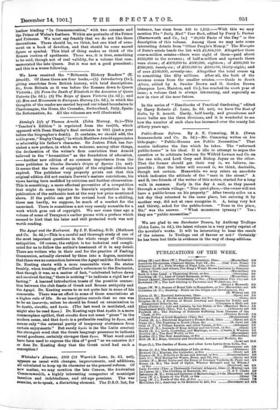The Agape and the Eucharist. By J. F. Keating, D.D.
(Methuen and Co. 3s. 6d.)—This is a careful and thorough study of one of the most important questions in the whole range of Christian antiquities. Of course, the subject is too technical and compli- cated for us to follow the author's treatment of it in any detail. There are writers who in their zeal for the practice of Fasting Communion, actually elevated by them into a dogma, maintain that there was no connection between the Agape and the Eucharist. Dr. Keating starts with a more reasonable view. He states frankly, when treating of Tertullian's references to the Eucharist, that though it was, as a matter of fact, "celebrated before dawn and received fasting," there is nothing "to indicate a rigid law of fasting." I learned introduction treats of the possible connec- tion between the club feasts of Greek and Roman antiquity and the Agape. Dr. Keating seems to us not quite fair in some of his comments. There was an effort in some of these associations at a higher rule of life. So an inscription records that no one was to be an ipargaris, unless he should be found on examination to be irycieds, secre3hr, and ic-yr6s. (The last word is mutilated, and might also be read firm) Dr. Keating says that aral41 is a mere commonplace epithet, that slarsi3ns does not mean " pious " in the modern sense, and that tryvdr is a preferable reading to 1-ytos, and means only "the external purity of temporary abstinence from certain enjoyments." But surely iryvos is (as the Latin sanctus) the strongest word that the Greek language possesses to indicate moral goodness, certainly stronger than tiros. What word could have been used to express the idea of " good " as we conceive it ? or does Dr. Keating deny that the Greek mind had such a conception ?














































 Previous page
Previous page